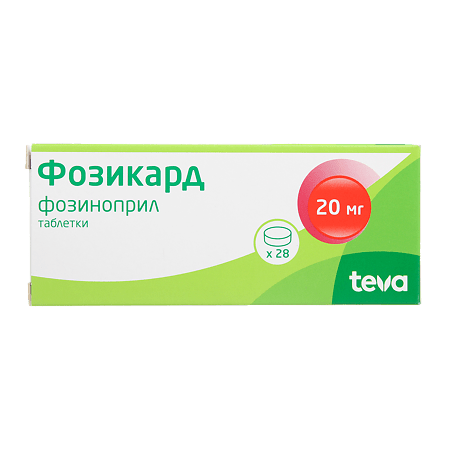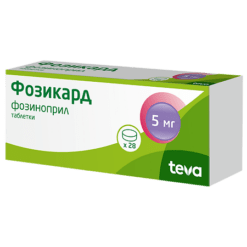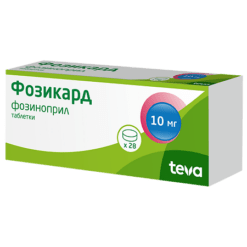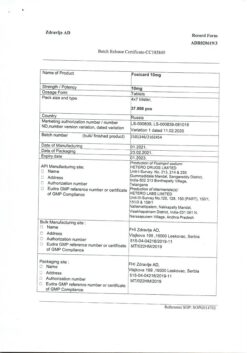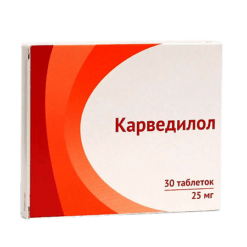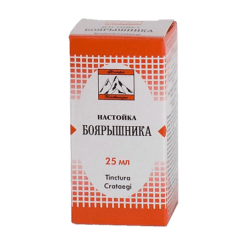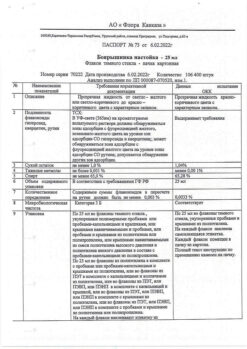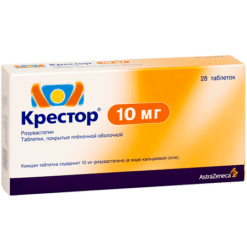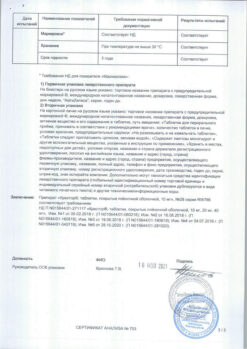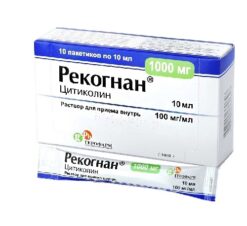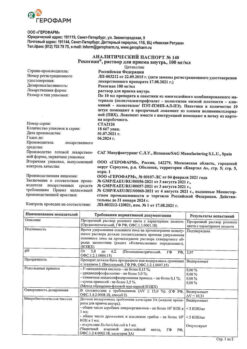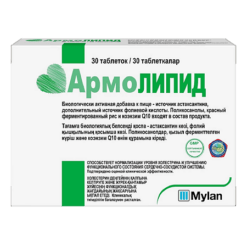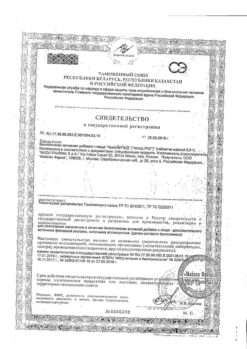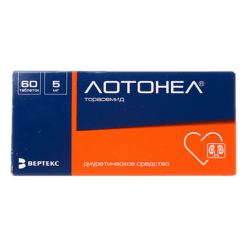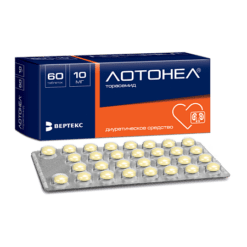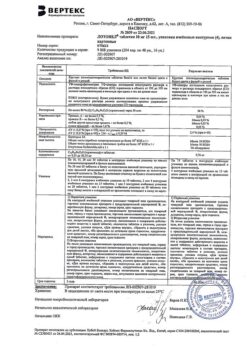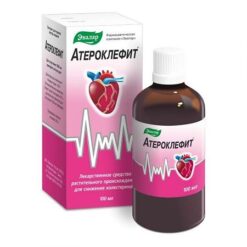No products in the cart.
Fozicard, tablets 20 mg 28 pcs
€13.73 €11.44
Description
Fosicard is an ACE inhibitor. Fosinopril is a complex ester from which the active metabolite, fosinoprilat, is formed in the body.
Fosinoprilat prevents the conversion of angiotensin I to the vasoconstrictor angiotensin II, which leads to vasodilation, decreased OPPS and decreased aldosterone secretion. By reducing the secretion of aldosterone there is a slight increase in serum potassium ions with a simultaneous loss of sodium ions and fluid from the body.
The drug has antihypertensive, vasodilatory, diuretic and potassium-saving effects. The antihypertensive effect is also due to inhibition of bradykinin metabolism, which has a marked vasodilator effect. The decrease of BP is not accompanied by changes in the blood circulation, cerebral and renal blood flow, blood supply of internal organs, skeletal muscles, skin, myocardial reflex activity.
The antihypertensive effect of the drug is maintained with long-term treatment, tolerance to the drug does not develop. After oral administration the antihypertensive effect develops within 1 hour, reaches a maximum after 2-6 hours and lasts for 24 hours.
Indications
Indications
Arterial hypertension (in monotherapy or in combination with other antihypertensive drugs (in particular, thiazide diuretics)).
Chronic heart failure (CHF) (as part of combination therapy).
Pharmacological effect
Pharmacological effect
Pharmacotherapeutic group: angiotensin-converting enzyme (ACE) inhibitor
ATH CODE: C09AA09
Pharmacological properties
Pharmacodynamics
ACE inhibitor from the subgroup of prodrugs. In the body, an active metabolite is formed from fosinopril – fosinoprilat, which prevents the conversion of angiotensin I into the vasoconstrictor peptide angiotensin II, which leads to vasodilation and decreased aldosterone secretion. It has antihypertensive, vasodilating, diuretic and potassium-sparing effects. Reduces total peripheral vascular resistance and systemic blood pressure (BP). The drug suppresses aldosterone synthesis and inhibits tissue ACE. The antihypertensive effect is also due to the suppression of the metabolism of bradykinin, which has a pronounced vasodilating effect. A decrease in blood pressure is not accompanied by changes in circulating blood volume (CBV), cerebral and renal blood flow, blood supply to internal organs, skeletal muscles, skin, or reflex activity of the myocardium. The antihypertensive effect persists with long-term treatment; tolerance to the drug does not develop. After oral administration, the antihypertensive effect develops within 1 hour, reaches a maximum after 2-6 hours and persists for 24 hours.
Pharmacokinetics
After oral administration, fosinopril is absorbed from the gastrointestinal tract. Absorption averages 30 – 40%. The extent of absorption is independent of food intake, but its rate may be slower. The time to reach maximum concentration in blood plasma is 3 hours and does not depend on the dose taken.
The binding of fosinoprilat to plasma proteins is 95%. Fosinoprilat has a relatively small volume of distribution and is poorly associated with cellular components of the blood. Does not penetrate the blood-brain barrier.
Fosinopril is eliminated from the body equally through the liver and kidneys.
In patients with arterial hypertension with normal renal and liver function, the half-life (T1/2) of fosinoprilat is approximately 11.5 hours. In patients with heart failure, the T1/2 value is 14 hours. The clearance of fosinoprilat during hemodialysis and peritoneal dialysis averages 2% and 7%, respectively, relative to the clearance values of urea.
In patients with impaired renal function (creatinine clearance (CC) less than 80 ml/min/1.73 m2), the total clearance of fosinoprilat from the body is approximately half that of patients with normal renal function. At the same time, absorption, bioavailability and protein binding do not change noticeably. Reduced excretion through the kidneys is compensated by increased excretion through the liver. A moderate increase in the area under the concentration-time curve (AUC) in blood plasma (less than twice the normal value) is observed in patients with varying degrees of renal failure, including end-stage renal failure (creatinine clearance less than 10 ml/min/1.73 m2).
In patients with impaired liver function (with alcoholic or biliary cirrhosis), the rate of hydrolysis of fosinopril may be reduced, but the degree of hydrolysis does not change noticeably. The total clearance of fosinoprilat in such patients is approximately half that of patients with normal liver function.
Special instructions
Special instructions
Before starting treatment, it is necessary to analyze previous antihypertensive therapy, the degree of increase in blood pressure, dietary restrictions on salt and/or liquid, and other clinical circumstances.
Patients with severe arterial hypertension or concomitant decompensated CHF should begin treatment with Fosicard in a hospital setting.
Before and during treatment with the drug, it is necessary to monitor blood pressure, kidney function, potassium content, hemoglobin, creatinine, urea, electrolyte concentrations and the activity of “liver” transaminases in the blood.
Angioedema
The development of angioedema has been reported in patients using the drug Fosicard. Swelling of the tongue, pharynx, or larynx can cause airway obstruction, which can be fatal. If such reactions develop, patients must stop taking the drug and subcutaneously administer a solution of epinephrine (adrenaline) (1:1000), as well as take other emergency treatment measures.
There is a risk of anaphylactic reactions during desensitization with hymenoptera venom while taking an ACE inhibitor.
The simultaneous use of APS inhibitors with the combination of valsartan + sacubitril is contraindicated due to the increased risk of angioedema. Taking Fosicard should not be started before 36 hours after taking the last dose of this combination, just as taking the combination of valsartan + sacubitril should not be started before 36 hours after taking the last dose of Fosicard.
Concomitant use of ACE inhibitors with racecadotril, mTOR inhibitors (such as sirolimus, everolimus, temsirolimus) and vildagliptin may lead to an increased risk of developing angioedema (see section “Interaction with other drugs”).
Swelling of the intestinal mucosa
Swelling of the intestinal mucosa has rarely been observed while taking ACE inhibitors. These patients complained of abdominal pain (there may have been no nausea and vomiting), in some cases swelling of the intestinal mucosa occurred without swelling of the face, and the level of C1-esterases was normal. Symptoms disappeared after stopping the use of ACE inhibitors. Edema of the intestinal mucosa should be included in the differential diagnosis of patients taking ACE inhibitors who complain of abdominal pain.
Anaphylactic reactions during dialysis using high-permeability membranes Anaphylactic reactions may develop in patients who used ACE inhibitors during hemodialysis through high-permeability membranes, as well as during apheresis of low-density lipoproteins with adsorption to dextran sulfate. In these cases, the use of a different type of dialysis membrane or other antihypertensive therapy should be considered.
Neutropenia/agranulocytosis
It is possible to develop agranulocytosis and suppression of bone marrow function during treatment with ACE inhibitors. These cases occur more often in patients with impaired renal function, especially in the presence of systemic connective tissue diseases (systemic lupus erythematosus or scleroderma). Before starting therapy with ACE inhibitors and during treatment, the total number of leukocytes and the leukocyte formula are determined (once a month in the first 3-6 months of treatment and in the first year of use of the drug in patients with an increased risk of neutropenia).
Arterial hypotension
In patients with uncomplicated arterial hypertension, arterial hypotension may develop due to the use of the drug Fosicard.
Symptomatic hypotension with the use of ACE inhibitors most often develops in patients after intensive treatment with diuretics, a diet limiting salt intake, or during renal dialysis. Transient arterial hypotension is not a contraindication for the use of the drug after measures to restore blood volume.
In patients with CHF, treatment with ACE inhibitors may cause excessive antihypertensive effects, which can lead to oliguria or azotemia, which can be fatal. Therefore, when treating CHF with Fosicard, it is necessary to carefully monitor patients, especially during the first 2 weeks of treatment, as well as with any increase in the dose of Fosicard or a diuretic.
A reduction in the diuretic dose may be required in patients with hyponatremia and in patients previously intensively treated with diuretics. Arterial hypotension is not a contraindication for further use of the drug Fosicard. Some reduction in systemic blood pressure is a common and desirable effect when starting the drug for heart failure. The extent of this reduction is greatest early in treatment and stabilizes within one or two weeks of starting treatment. Blood pressure usually returns to pre-treatment values without a decrease in therapeutic efficacy.
Liver dysfunction
If noticeable jaundice appears and a marked increase in the activity of liver enzymes, Fosicard should be discontinued and appropriate treatment should be prescribed.
In rare cases, when using ACE inhibitors, a syndrome is observed, the first manifestation of which is cholestatic jaundice. This is followed by fulminant liver necrosis, sometimes fatal. The mechanism of development of this syndrome has not been studied.
In patients with impaired liver function, increased plasma concentrations of fosinopril may be observed. In liver cirrhosis (including alcoholic cirrhosis), the apparent total clearance of fosinopril is reduced, and the AUC is approximately 2 times higher than in patients without liver dysfunction.
Renal dysfunction
In patients with arterial hypertension with bilateral renal artery stenosis or stenosis of the artery of a single kidney, as well as with simultaneous use of diuretics without signs of renal impairment, the concentration of blood urea nitrogen and serum creatinine may increase during treatment with ACE inhibitors. These effects are usually reversible and disappear after treatment is stopped. A dose reduction of the diuretic and/or Fosicard may be required.
In patients with severe CHF with altered activity of the renin-angiotensin-aldosterone system, treatment with ACE inhibitors can lead to oliguria, progressive azotemia and, in rare cases, acute renal failure and possible death.
Hyperkalemia
Increases in serum potassium levels have been observed in some patients receiving ACE inhibitor therapy, including fosinopril. Patients at increased risk of developing hyperkalemia include: patients with impaired renal function or diabetes mellitus, patients taking potassium-sparing diuretics, potassium supplements or potassium-containing salt substitutes, and patients taking other drugs that may increase serum potassium levels (eg, heparin, trimethoprim, or co-trimoxazole, also known as a combination of trimethoprim and sulfamethoxazole) and especially aldosterone antagonists or angiotensin receptor blockers. If the simultaneous use of these drugs is considered necessary, it is recommended to periodically monitor the level of potassium in the blood serum (see section “Interaction with other drugs”).
Cough
When using ACE inhibitors, including fosinopril, some patients may experience a nonproductive, persistent cough that resolves after discontinuation of therapy. When cough occurs in patients taking ACE inhibitors, this therapy should be considered as a possible cause in the differential diagnosis.
Surgery/general anesthesia
ACE inhibitors may enhance the antihypertensive effect of drugs used for general anesthesia. Before surgery (including dentistry), the surgeon/anesthesiologist must be warned about the use of ACE inhibitors.
Special patient groups
Fosinopril (like other ACE inhibitors) has a less pronounced antihypertensive effect and has a higher risk of developing angioedema in black patients compared to representatives of other races.
There is no experience with the use of fosinopril in patients who have recently undergone kidney transplantation.
The drug should be used with caution in patients with obstruction of the blood outflow tract from the left ventricle (aortic or mitral stenosis/hypertrophic obstructive cardiomyopathy).
Caution should be exercised when performing work requiring increased attention, as dizziness may occur, especially after the initial dose of an ACE inhibitor in patients taking diuretics. Caution should be exercised when performing physical exercise or in hot weather due to the risk of dehydration and hypotension due to a decrease in blood volume.
The safety and effectiveness of Fosicard in children has not been established.
Impact on the ability to drive vehicles and machinery
Care must be taken when driving vehicles and working with mechanisms that require increased concentration and speed of psychomotor reactions.
Active ingredient
Active ingredient
Fosinopril
Composition
Composition
1 tablet contains:
active ingredient: fosinopril sodium 5 mg, 10 mg, 20 mg.
excipients: lactose monohydrate 59/118/108 mg, croscarmellose sodium 2/4/4 mg, pregelatinized corn starch (starch 1500) 12/24/24 mg, microcrystalline cellulose 20/40/40 mg, glyceryl dibehenate 2/4/4 mg, magnesium stearate -/traces/traces.
Pregnancy
Pregnancy
Phosicard is contraindicated for use during pregnancy. The use of ACE inhibitors in the second and third trimester of pregnancy causes damage or even death to the developing fetus. For newborns whose mothers took ACE inhibitors during pregnancy, it is recommended to carefully monitor for timely detection of arterial hypotension, oliguria and hyperkalemia.
Fosinopril is excreted into breast milk, so taking the drug during lactation is not recommended.
If the use of the drug during this period is necessary, breastfeeding should be stopped.
Contraindications
Contraindications
Hypersensitivity to fosinopril, other components of the drug or to other ACE inhibitors (including a history).
Hereditary or idiopathic angioedema; history of angioedema (including after use of other ACE inhibitors).
Concomitant use with aliskiren and drugs containing aliskiren in patients with diabetes mellitus and/or moderate or severe renal impairment (glomerular filtration rate (GFR) less than 60 ml/min/1.73 m2 body surface area).
Concomitant use with angiotensin II receptor antagonists (ARA II) in patients with diabetic nephropathy.
Concomitant use with neutral endopeptidase inhibitors (for example, with drugs containing sacubitril) due to the high risk of developing angioedema (see section “Interaction with other drugs”).
Lactase deficiency, lactose intolerance, glucose-galactose malabsorption.
Pregnancy.
Breastfeeding period.
Age up to 18 years (efficacy and safety have not been established).
With caution
Arterial hypotension, bilateral renal artery stenosis or stenosis of the artery of a single kidney; renal failure; condition after kidney transplantation; aortic or mitral stenosis; hypertrophic obstructive cardiomyopathy; CHF III-IV functional class (NYHA classification); coronary heart disease (CHD); cerebrovascular diseases (including cerebrovascular insufficiency); systemic connective tissue diseases (including systemic lupus erythematosus, scleroderma), inhibition of bone marrow hematopoiesis; immunosuppressive therapy, simultaneous use of allopurinol or procainamide, or a combination of these complicating factors (increased risk of developing neutropenia and agranulocytosis); diabetes mellitus; hyperkalemia; simultaneous use with potassium-sparing diuretics, potassium preparations, potassium-containing substitutes for table salt; simultaneous use with lithium preparations; a history of severe allergies or angioedema; simultaneous desensitization; simultaneous apheresis of low-density lipoproteins using dextran sulfate; simultaneous hemodialysis using high-flow membranes; conditions accompanied by a decrease in blood volume (including diarrhea, vomiting, previous treatment with diuretics, following a diet with limited salt), hyponatremia (risk of dehydration, arterial hypotension, chronic renal failure); use during major surgical procedures or during general anesthesia; use in patients of the Negroid race; use in elderly patients.
Side Effects
Side Effects
Adverse reactions are systematized in accordance with the World Health Organization (WHO) Classification: very common (≥1/10); often (≥1/100, <1/10); uncommon (≥1/1000, <1/100); rare (≥1/10000, <1/1000); very rare (< 1/10000); frequency unknown (cannot be determined from available data).
Infectious and parasitic diseases: often – upper respiratory tract infections, pharyngitis, rhinitis, viral infections; frequency unknown – pneumonia, laryngitis, sinusitis, tracheobronchitis.
Blood and lymphatic system disorders: frequency unknown – eosinophilia, leukopenia, inflammation of the lymph nodes, neutropenia.
Metabolic and nutritional disorders: frequency unknown – loss of appetite, anorexia, changes in body weight, exacerbation of gout, hyperkalemia.
Mental disorders: often – insomnia, drowsiness, mood changes; frequency unknown – depression, confusion, anxiety.
Nervous system disorders: often – dizziness, headache, paresthesia; infrequently – fainting; frequency unknown – cerebral ischemia, stroke, tremor, imbalance, memory impairment, drowsiness.
Visual disturbances: often – visual disturbances.
Hearing and labyrinthine disorders: frequency unknown – pain, tinnitus, dizziness.
Cardiac disorders: often – palpitations, arrhythmias, angina pectoris; frequency unknown – myocardial infarction, tachycardia, cardiac arrest, conduction disturbance.
Vascular disorders: often – marked decrease in blood pressure, orthostatic hypotension; infrequently – shock; frequency unknown – hypertensive crisis, “flushes” of blood to the facial skin, hemorrhages, hypertension, peripheral vascular diseases.
Disorders of the respiratory system, chest and mediastinal organs: often – dry cough, sinus disorders; frequency unknown – pulmonary infiltrates, bronchospasm, dysphonia, shortness of breath, nosebleeds, rhinorrhea, sinusitis, chest pain.
Gastrointestinal disorders: often – nausea, vomiting, diarrhea, dyspepsia, abdominal pain, dry oral mucosa, bloating, dysgeusia; frequency unknown – pancreatitis, swelling of the tongue, dysphagia, constipation, dry mouth, flatulence.
Disorders of the liver and biliary tract: frequency unknown – hepatitis.
Disorders of the skin and subcutaneous tissues: often – skin rash; uncommon – angioedema; frequency unknown – increased sweating, bleeding into the skin (ecchymosis), itching, dermatitis, urticaria.
Musculoskeletal and connective tissue disorders: often – musculoskeletal pain, myalgia; frequency unknown – arthritis, muscle weakness.
Renal and urinary tract disorders: often – urinary disorders; frequency unknown – development or worsening of symptoms of chronic renal failure.
Disorders of the genital organs and mammary gland: often – sexual dysfunction; frequency unknown – prostate disorders.
General disorders and disorders at the injection site: often – fatigue, chest pain, swelling, asthenia; frequency unknown – peripheral edema, painful pyrexia.
Laboratory and instrumental data: often – increased activity of “liver” transaminases, hyperbilirubinemia; uncommon – increased urea concentration, hypercreatininemia; rarely – hyponatremia, decreased hemoglobin and hematocrit; frequency unknown – increased erythrocyte sedimentation rate (ESR).
Effect on the fetus: impaired development of the fetal kidneys, decreased blood pressure in the fetus and newborns, impaired renal function, hypoplasia of the skull bones, oligohydramnios, contracture of the limbs, pulmonary hypoplasia.
Interaction
Interaction
Dual blockade of the renin-angiotensin-aldosterone system
The literature has reported that in patients with established atherosclerotic disease, heart failure, or diabetes mellitus with end-organ damage, dual blockade of the renin-angiotensin-aldosterone system (RAAS) with ARB II, ACE inhibitors, or aliskiren (a direct renin inhibitor) is associated with an increased incidence of hypotension, syncope, hyperkalemia, and renal dysfunction (including acute renal failure), when compared with the use of one drug that affects the RAAS. Dual blockade (for example, the appointment of ACE inhibitors with ARB II or aliskiren) should be carried out only in certain specific situations, regularly monitoring renal function.
The simultaneous use of ACE inhibitors with medicinal products containing aliskiren is contraindicated in patients with diabetes mellitus and/or with moderate or severe renal impairment (GFR less than 60 ml/min/1.73 m2 body surface area) and is not recommended in other patients.
Concomitant use of ACE inhibitors with ARB II is contraindicated in patients with diabetic nephropathy and is not recommended in other patients.
Potassium-sparing diuretics, potassium preparations, potassium-containing table salt substitutes and other drugs that can increase the potassium content in the blood serum
Potassium preparations, potassium-sparing diuretics (amiloride, spironolactone, eplerenone, triamterene), potassium preparations, potassium-containing salt substitutes and other drugs that can increase serum potassium levels (including angiotensin II receptor antagonists, heparin, tacrolimus, cyclosporine; drugs containing co-trimoxazole [trimethoprim + sulfamethoxazole]) increase the risk of developing hyperkalemia.
In patients with chronic heart failure, diabetes mellitus, and concomitantly taking potassium-sparing diuretics, potassium, potassium-containing salt substitutes or other drugs that cause hyperkalemia (for example, heparin), ACE inhibitors increase the risk of developing hyperkalemia.
Potassium-sparing (thiazide and loop) diuretics
With the simultaneous use of fosinopril with diuretics, especially at the beginning of diuretic therapy, as well as in combination with a strict diet that limits sodium intake, or with hemodialysis, a pronounced decrease in blood pressure may develop, especially in the first hour after taking the initial dose of fosinopril.
Other antihypertensive drugs
Antihypertensive drugs, opioid analgesics, drugs for general anesthesia enhance the antihypertensive effect of fosinopril.
Lithium preparations
In patients receiving fosinopril simultaneously with lithium preparations, there may be an increase in the concentration of lithium in the blood plasma and the risk of developing lithium intoxication (careful monitoring of the lithium content in the blood plasma is recommended).
Nonsteroidal anti-inflammatory drugs (NSAIDs), including selective cyclooxygenase-2 (COX-2) inhibitors and high doses of acetylsalicylic acid (> 3 g/day)
It is known that indomethacin and other NSAIDs, incl. selective cyclooxygenase-2 (COX-2) inhibitors and acetylsalicylic acid in doses exceeding 3 g per day may reduce the antihypertensive effect of ACE inhibitors, especially in patients with low-renin arterial hypertension. In patients over 65 years of age, with hypovolemia (including during treatment with diuretics), with impaired renal function, simultaneous administration of NSAIDs, including selective COX-2 inhibitors and ACE inhibitors (including fosinopril) can lead to deterioration of renal function, including acute renal failure. Usually this condition is reversible. Renal function should be carefully monitored in patients taking fosinopril and NSAIDs.
Hypoglycemic drugs
Fosinopril enhances the hypoglycemic effect of sulfonylurea derivatives and insulin.
Allopurinol, procainamide, cytostatics, immunosuppressants, glucocorticosteroids (for systemic use)
Fosinopril increases the risk of developing leukopenia/agranulocytosis when used simultaneously with allopurinol, cytostatic agents, immunosuppressants, procainamide.
Estrogens
Estrogens weaken the antihypertensive effect of fosinopril due to their ability to retain water.
mTOR (mammalian Target of Rapamycin) inhibitors (eg, temsirolimus, sirolimus, everolimus)
In patients taking ACE inhibitors and mTOR inhibitors simultaneously (temsirolimus, sirolimus, everolimus), an increased incidence of angioedema was observed.
Dipeptidyl peptidase type IV (DPP-IV) inhibitors (gliptins), eg sitagliptin, saxagliptin, vildagliptin, linagliptin
An increased incidence of angioedema was observed in patients taking ACE inhibitors and dipeptidyl peptidase type IV inhibitors (gliptins) simultaneously.
Estramustine
Increased incidence of angioedema when used simultaneously with ACE inhibitors.
Neutral endopeptidase inhibitors (NEP)
An increased risk of angioedema has been reported with concomitant use of ACE inhibitors and racecadotril (an enkephalinase inhibitor used to treat acute diarrhea).
When ACE inhibitors are used simultaneously with drugs containing sacubitril (neprilysin inhibitor), the risk of developing angioedema increases, and therefore the simultaneous use of these drugs is contraindicated. ACE inhibitors should be prescribed no earlier than 36 hours after discontinuation of drugs containing sacubitril in patients receiving ACE inhibitors, as well as within 36 hours after discontinuation of ACE inhibitors.
Tissue plasminogen activators
Observational studies have shown an increased incidence of angioedema in patients taking ACE inhibitors following the use of alteplase for thrombolytic therapy of ischemic stroke.
Pharmacokinetic interactions
The simultaneous use of antacids (including aluminum or magnesium hydroxide), as well as the carminative simethicone, may reduce the absorption of fosinopril, so these drugs should be taken at least 2 hours apart.
The bioavailability of fosinopril when used simultaneously with chlorthalidone, nifedipine, propranolol, hydrochlorothiazide, cimetidine, metoclopramide, propantheline bromide, digoxin and warfarin does not change.
Overdose
Overdose
Symptoms: marked decrease in blood pressure, bradycardia, shock, water-electrolyte imbalance, acute renal failure, stupor.
Treatment: the drug should be stopped, gastric lavage, sorbents (for example, activated carbon), vasodepressants, infusion of 0.9% sodium chloride solution, and then symptomatic and supportive treatment are indicated. The use of hemodialysis is ineffective.
Storage conditions
Storage conditions
Store at a temperature not exceeding 25 C.
Keep out of the reach of children!
Shelf life
Shelf life
2 years.
Do not use after expiration date.
Manufacturer
Manufacturer
Zdravle HFZ AD, Serbia
Additional information
| Shelf life | 2 years |
|---|---|
| Conditions of storage | At a temperature not exceeding 25 °C |
| Manufacturer | Zdravle HFZ AD, Serbia |
| Medication form | pills |
| Brand | Zdravle HFZ AD |
Other forms…
Related products
Buy Fozicard, tablets 20 mg 28 pcs with delivery to USA, UK, Europe and over 120 other countries.

